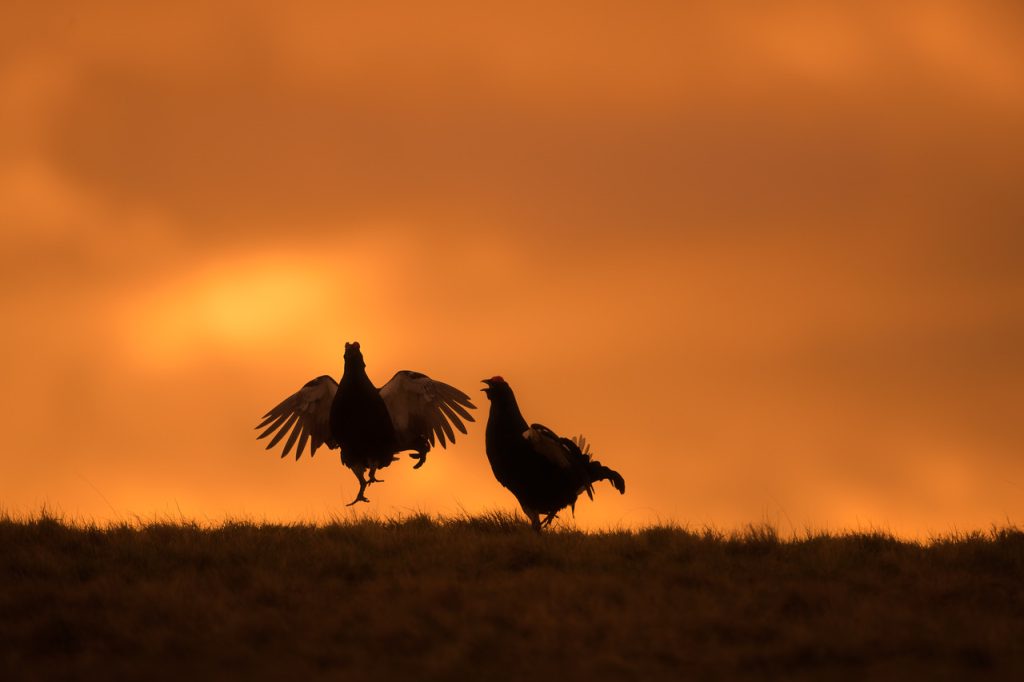A project to restore upland habitats for black grouse and other iconic upland species has been awarded a share of £7.6m from the Scottish Government’s Nature Restoration Fund.
‘Undoing the Silence of the Uplands’ has been awarded £33,000 to develop the project theme of improving habitats for black grouse with landowners across five core areas – Galloway Forest Park, Lowther hills, Tweedsmuir/Moffat hills, Langholm moor and Moorfoot Hills. This is one of 31 projects that NatureScot has approved to receive funding as part of a national drive to transform nature in Scotland. The development phase will complete May 2023 with a significant funding bid for a multi-year delivery project being submitted and hopefully started autumn 2023. For more information visit www.sup.org.uk/projects/black-grouse-recovery-project
Managed by NatureScot, The Scottish Government’s £65 million Nature Restoration Fund supports projects that help Scotland’s species, woodlands, rivers and seas, as well as improving the health and wellbeing of local communities. These projects take practical steps to help against the twin crises of climate change and biodiversity loss, and restore Scotland’s natural environment.
Darren Flint, Southern Uplands Partnership Project Officer said:
“After a few years of partnership working with landowners and stakeholders across southern Scotland seeking to improve the outlook for the increasingly scarce black grouse, it is wonderful to receive this support from NatureScot. We look forward to the day when the distinctive call and wildlife spectacle of lekking males will once again be a frequent sight across our uplands.”
Biodiversity Minister Lorna Slater said:
“Our Nature Restoration Fund is making a difference across the length and breadth of Scotland, restoring our incredible natural environment, helping wildlife thrive, and investing in rural communities. Scotland’s nature is so important to all of us – our woodlands, peatlands, rivers and lochs are central to our cultural heritage and identity. But this complex diversity and abundance of life is also central to our survival as a species. Our economy, jobs, health and wellbeing depend on it. Nature-based solutions – restoring our peatlands and native forests for example – are also key to our success in tackling the climate crisis.
“Following the agreement of new global targets to end extinctions and restore nature, we have published our new Scottish Biodiversity Strategy, setting out our high-level ambition for a nature positive future in Scotland by 2030. This year we will follow it with a new Delivery Plan setting out how we will achieve our stretching goals, including protecting 30% of our land and seas for nature by 2030. Our world leading Nature Restoration Fund will help us achieve that goal by delivering real, transformative change across the country.”
Chair of NatureScot Mike Cantlay said:
“Large-scale nature restoration projects are vital to help us tackle the twin crises of biodiversity loss and climate change. If we are to have any chance of saving nature, then we must do everything we can to halt its decline now.
“The Nature Restoration Fund supports ambitious action to put Scotland’s land and seas, and all the wild species that inhabit them, back on the road to recovery. It is project like this one that will make a real and positive difference and we’re excited to see how it progresses. With the Nature Restoration Fund, we are helping Scotland to halt biodiversity loss by 2030 and reverse it by 2045.”
Since its launch in July 2021, the Nature Restoration Fund has awarded £17 million to 127 projects across Scotland through its Helping Nature and Transforming Nature funding streams.





